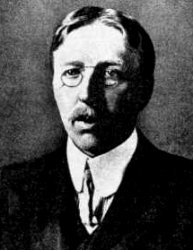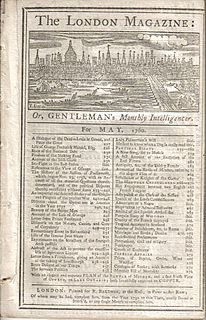Related Research Articles

Ford Madox Ford was an English novelist, poet, critic and editor whose journals The English Review and The Transatlantic Review were instrumental in the development of early 20th-century English and American literature.

The Spectator is a weekly British magazine on politics, culture, and current affairs. It was first published in July 1828, thus making it the oldest weekly magazine in the world.

Percy Wyndham Lewis was an English writer, painter, and critic. He was a co-founder of the Vorticist movement in art and edited BLAST, the literary magazine of the Vorticists.

Douglas Richard Hurd, Baron Hurd of Westwell, is a British Conservative politician who served in the governments of Margaret Thatcher and John Major from 1979 to 1995.

Basil Cheesman Bunting was a British modernist poet whose reputation was established with the publication of Briggflatts in 1966, generally regarded as one of the major achievements of the modernist tradition in English. He had a lifelong interest in music that led him to emphasise the sonic qualities of poetry, particularly the importance of reading poetry aloud. He was an accomplished reader of his own work.
"The British Poetry Revival" is the general name given to a loose poetry movement in Britain that took place in the 1960s and 1970s. The revival was a modernist-inspired reaction to the Movement's more conservative approach to British poetry. The poets included an older generation - Bob Cobbing, Paula Claire, Tom Raworth, Eric Mottram, Jeff Nuttall, Andrew Crozier, Lee Harwood, Allen Fisher, Iain Sinclair—and a younger generation: Paul Buck, Bill Griffiths, John Hall, John James, Gilbert Adair, Lawrence Upton, Peter Finch, Ulli Freer, Ken Edwards, Robert Gavin Hampson, Gavin Selerie, Frances Presley, Elaine Randell, Robert Sheppard, Adrian Clarke, Clive Fencott, Maggie O'Sullivan, Cris Cheek, Tony Lopez and Denise Riley.

George Wyndham, PC was a British Conservative politician, statesman, man of letters, and one of The Souls.
Modernist poetry refers to poetry written, mainly in Europe and North America, between 1890 and 1950 in the tradition of modernist literature, but the dates of the term depend upon a number of factors, including the nation of origin, the particular school in question, and the biases of the critic setting the dates. The critic/poet C. H. Sisson observed in his essay Poetry and Sincerity that "Modernity has been going on for a long time. Not within living memory has there ever been a day when young writers were not coming up, in a threat of iconoclasm."
William Cookson was a British poet, writer on poetry and literary editor, best known for his influential poetry magazine Agenda.
The Dial was an American magazine published intermittently from 1840 to 1929. In its first form, from 1840 to 1844, it served as the chief publication of the Transcendentalists. From the 1880s to 1919 it was revived as a political review and literary criticism magazine. From 1920 to 1929 it was an influential outlet for modernist literature in English.

The London Magazine is a publication of arts, literature and miscellaneous interests. Its history ranges across nearly three centuries and several reincarnations, publishing writers including William Wordsworth, William S. Burroughs, Winston Churchill and John Keats.
Literary modernism, or modernist literature, originated in the late 19th and early 20th centuries, mainly in Europe and North America, and is characterized by a self-conscious break with traditional ways of writing, in both poetry and prose fiction writing. Modernism experimented with literary form and expression, as exemplified by Ezra Pound's maxim to "Make it new." This literary movement was driven by a conscious desire to overturn traditional modes of representation and express the new sensibilities of their time. The horrors of the First World War saw the prevailing assumptions about society reassessed, and much modernist writing engages with the technological advances and societal changes of modernity moving into the 20th century.
Nationality words link to articles with information on the nation's poetry or literature.
The Contemporary Review is a British biannual, formerly quarterly, magazine. It has an uncertain future as of 2013.

Charles Whibley (1859–1930) was an English literary journalist and author. Whibley's style was described by Matthew as "often acerbic high Tory commentary". In literature and the arts, his views were progressive. He supported James Abbott McNeill Whistler. He also recommended T. S. Eliot to Geoffrey Faber, which resulted in Eliot's being appointed as an editor at Faber and Gwyer. Eliot's essay Charles Whibley (1931) was contained within his Selected Essays, 1917-1932. Whibley died on 4 March 1930 at Hyères, France, and his body was buried at Great Brickhill, Buckinghamshire.

Sir Percy Angier Hurd was a British journalist and Conservative Party politician who served as a Member of Parliament for nearly thirty years. He was the first of four generations of Hurds to serve as Conservative MPs.
The English Review was an English-language literary magazine published in London from 1908 to 1937. At its peak, the journal published some of the leading writers of its day.
British Bandsman is a magazine published weekly devoted to British brass band music. It was founded in 1887 by Sam Cope (1856–1948) and acquired by The Salvation Army in 2004, before being sold in April 2015 to KGC Media Ltd., a company formed by the publication's then Managing Editor In August 2014, it was confirmed by Guinness World Records as the world's oldest weekly music magazine.
Redimiculum Matellarum was the first collection of poetry published by Basil Bunting.
References
- ↑ Brake, Laurel; Demoor, Marysa, eds. (2009). Dictionary of Nineteenth-century Journalism in Great Britain and Ireland. Academia Press. p. 333. ISBN 978-9-038-21340-8.
- 1 2 "Fleet Street Stir". Yorkshire Post and Leeds Intelligencer. British Newspaper Archive. 28 February 1942. p. 4. Retrieved 6 August 2014.(subscription required)
- 1 2 3 Cohen, Scott A. (Spring 2009). "Imperialism Tempered by Expediency: Conrad and The Outlook". Conradiana. 41 (1): 48–66. doi:10.1353/cnd.0.0030.
- 1 2 3 Brake, Laurel; Demoor, Marysa, eds. (2009). Dictionary of Nineteenth-century Journalism in Great Britain and Ireland. Academia Press. pp. 280, 445, 691. ISBN 978-9-038-21340-8.
- ↑ "George Wyndham". Boston Evening Transcript. 11 April 1903. p. 32. Retrieved 6 August 2014.
- ↑ Thompson, Andrew Stuart (2000). Imperial Britain: The Empire in British Politics, C. 1880-1932 . Longman. p. 66. ISBN 978-0-582-31921-9.
- ↑ Snaith, Anna (2014). Modernist Voyages: Colonial Women Writers in London, 1890–1945. Cambridge University Press. pp. 95–96. ISBN 978-1-107-78249-5.
- ↑ Vogeler, Martha S. (2008). Austin Harrison and the English Review . University of Missouri Press. pp. 39, 46–47. ISBN 978-0-826-26668-2.
- ↑ Thompson, J. Lee (2007). Forgotten Patriot: A Life of Alfred, Viscount Milner of St. James's and Cape Town, 1854-1925. Fairleigh Dickinson University Press. p. 242. ISBN 978-0-838-64121-7.
- ↑ Robbins, Keith (1994). Politicians, Diplomacy and War in Modern British History. A. & C. Black. p. 95. ISBN 978-0-826-46047-9.
- ↑ Green, E. H. H. (2005). The Crisis of Conservatism: The Politics, Economics and Ideology of the Conservative Party, 1880-1914. Routledge. p. 132. ISBN 978-1-134-76388-7.
- ↑ Burton, Richard (2013). A Strong Song Tows Us: The Life of Basil Bunting, Britain's Greatest Modernist Poet. Infinite Ideas. pp. 133, 144–145. ISBN 978-1-909-65248-4.
- ↑ Burton, Richard (2013). A Strong Song Tows Us: The Life of Basil Bunting, Britain's Greatest Modernist Poet. Infinite Ideas. p. 149. ISBN 978-1-909-65248-4.